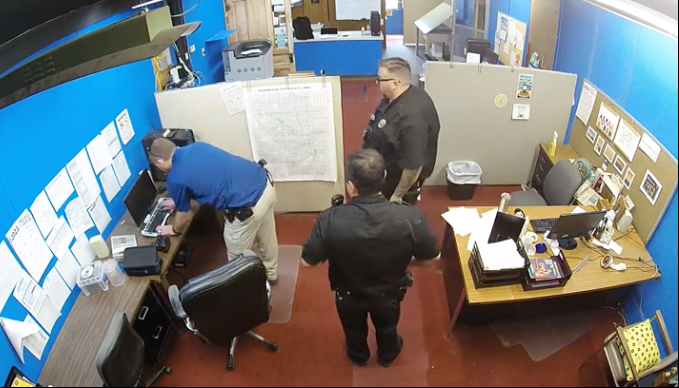
Officers raiding the Marion County Record hoped out loud that the devices they seized were not encrypted so they could illegally search them.
Last Friday’s raid of the Marion County Record has captured national and international media attention and is shining a much-needed spotlight on the erosion of press freedom in the U.S. Hopefully the raid and its tragic aftermath (the Record’s 98-year-old co-owner, in shock from the ordeal, died the next day) prompts the reversal of that troubling trend.
But until then, journalists and newsrooms need to adapt to the current reality that many U.S. law enforcement officers and judges — from Marion to Manhattan — couldn't care less about the First Amendment. And part of that adaptation means that journalists’ devices and communications must be encrypted.
If you’re not convinced, just watch the video of the raid in Marion, which shows (at around 2:44) a police officer, while seizing multiple devices, commenting, “I don’t believe that this is encrypted so I think we’re OK.”
We’re not here to blame the Record — they’re the victims in this fiasco (and for all we know, the officer was wrong and the devices actually were encrypted). Many journalists, especially at smaller, local news outlets like the Record, may not give much thought to the prospect of police ransacking their newsrooms and homes over routine efforts to verify news tips using public records. That's understandable, given that their newsgathering is protected by both federal and state law and the Constitution. Yet here we are.
Our Digital Security team responded to the raid with a guide for journalists and newsrooms on how to prepare for a Marion-like situation, including how you can encrypt your computers and cell phones now if they are not already.
“When seizing a device,” our Principal Researcher Dr. Martin Shelton wrote, “law enforcement officials hope yours is unencrypted because an encrypted device is significantly more time consuming to examine without your permission.” That means cops are far less likely to recover confidential source communications and newsgathering materials from an illegally seized device if it's encrypted.
Our team has also published numerous guides and resources for newsrooms looking to improve their digital security practices, through encryption and other means. And we welcome any journalists or publishers to contact us to arrange a digital security training session so we can help them adapt to the threats journalists now face.



